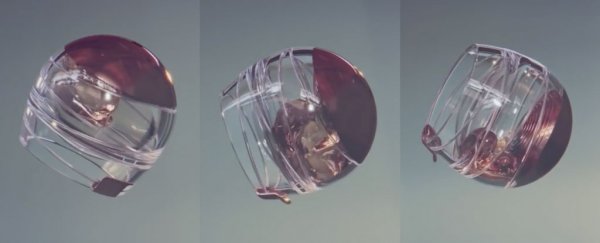
It's probably safe to say that, among the problems that people face in the world today, figuring out how to conveniently drink liquids in a zero-gravity environment doesn't rank as a high-priority item on the agenda.
But who knows? Maybe one day it will, and that day you might be thankful that the makers of Ballantine's Scotch – or at least their artsy marketing gurus – have put their best people on the job. The distillery's 'Space Glass' is the world's first whisky glass designed to work in gravity-less conditions. (Strictly speaking, the Space Glass is actually intended for microgravity environments, where g-forces are imperceptibly small, if not technically non-existent.)
The Space Glass has actually got a fairly complex design, but the key points are the features aiming to solve the fundamental problems of drinking in space: pouring, holding, and sipping liquid which, if left to its own devices in a microgravity environment, would float formlessly to lots of places that aren't your mouth.
The design features a magnet in the base to allow it to easily dock with a "bespoke whisky insert nozzle". Once connected, the beverage flows via a one-way valve from the bottle into the glass, where it's contained in a nearly invisible spherical chamber.
When the drinker sips at a mouthpiece attached to the rim, whisky (or whatever your poison is) is sucked up through a helix embedded in the side of the tumbler, much like a straw.
"Not only is the glass innovative – solving fundamental scientific questions of how liquid moves in zero gravity – but it is also beautifully designed, with the ritual of the whisky drinking experience at its heart," said Peter Moore, Ballantine's brand director, in an announcement of the glass.
One disappointment with the Space Glass is that it isn't actually made from glass. The custom design required Ballantine's to 3D-print the drinking vessel using plastic. ("Space Cup" doesn't confer quite the same gravitas, though, does it?)
While they could theoretically now 3D-print the Space Glass with actual glass thanks to more recent innovations, easily-shattering materials might not be the safest thing to have floating around in microgravity environments where alcohol is being consumed. Especially when you consider the Space Glass's weight – the base magnet takes it to over 10 kg.
In other space whisky news this week – yep, that's a real thing now – Ardbeg's whisky aged aboard the International Space Station has been fully assessed, with the distillery concluding that space whisky offers a "quite different set of flavours".
For more detail there's a publicly available white paper on the experiment. There's no word yet on Suntory's more recent space whisky batch, which has only just begun its maturation.
